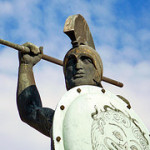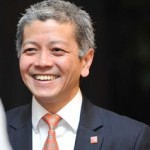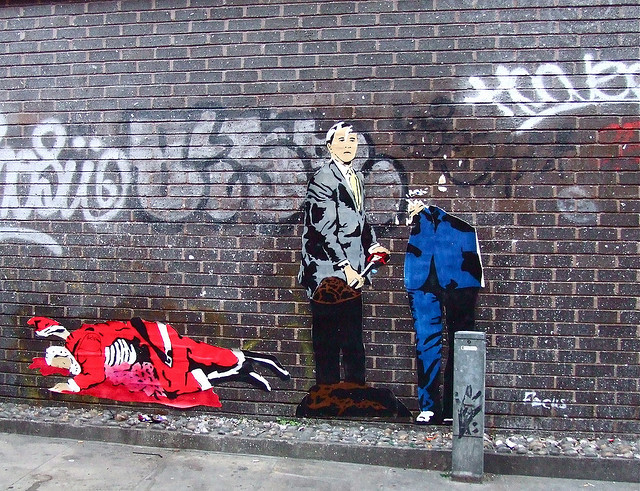How we choose our political leaders tells the world a lot about us
Nearly all democratic countries’ accept, to varying degrees, the notion that rulers should be chosen by the people, and subject to various limitations, checks and balances. However, many people who subscribe to these ideals are also comfortable with the notion of a benign hegemon in the international realm – namely the United States. Here, LSE’s Danny Quah argues that history will note with interest the point at which the US reaches its ‘Marie Antoinette’ moment, and observes that how we choose our leaders tell the world a lot about us.
What if a society decided its governing leaders must be chosen only from the richest and most powerful of its families? What if those political leaders held status and wealth, not only already greater but growing faster than that for anybody else in that society? What if, even though they wielded unrivalled influence, those leaders installed armed guards on every strategic street corner? What if those leaders operated with no counterbalancing competition, no checks and balances?
Most of us would find such a political system troubling: why ever would any society consciously, willingly settle on a system so objectionable? Even if those governing families were initially wise and benevolent, why would they remain so? Can any such system of autocratic control remain flexible to adapt to constantly-changing circumstances? For how long can we trust that ruling family? When will those leaders go from benevolent and wise to grasping, selfish, extractive, and mean?
The strange thing is many observers actually find such a situation perfectly acceptable, indeed desirable, when it comes to global governance. In the first paragraph above, replace the words “society” by “the community of nations” and “families” by “countries”; substitute the phrase “governing leaders” by “global hegemon”. The paragraph then becomes not a set of queries but a celebration of the age of US unipolarity. Compare its wording with for instance what John Ikenberry wrote in 2005:
“American global power — military, economic, technological, cultural, political — is one of the great realities of our age. Never before has one country been so powerful or unrivaled. The United States emerged from the Cold War as the world´s only superpower and grew faster than Europe and Japan in the decade that followed. American bases and naval forces encircle the globe. […] For the first time in the modern age, the world´s most powerful state can operate on the global stage without the fear of counterbalancing competitors. The world has entered the age of American unipolarity.”
The 2008 Global Financial Crisis shook that age of US unipolarity. But an important strand of economic thinking yearns for its resurgence. In their book The Leaderless Economy, Peter Temin and David Vines write:
When no country can or will act as hegemon, a world crisis erupts. […] The weakness of the recovery from the Global Financial Crisis of 2008 and the future risks to this recovery is the result of the United States’ diminished influence and the lack of a successor on the world stage.
In this call they are joined by economists such as Brad Delong and Barry Eichengreen who echo Charles Kindleberger and pronounce the problem as the loss of “the power and willingness of the US to bear the responsibility and burden of sacrifice required of benevolent hegemony”.

Although its military prowess and actions against the Persian Empire at the 480BCE Battle of Thermopylae were critical, Sparta chose not to join the Delian League of Greek city states that formed shortly thereafter. It was instead Athens, first among equals and the original hegemon, who took upon that benevolent leadership role and headed up the Delian League. But Athens soon turned rogue, going from hegemon to imperialistic power: The rest of the Delian League – joined then by Sparta – rose up against Athens, and over the course of the Pelopennesian War sacked and burnt Athens to the ground.
Why do writers otherwise deeply suspicious of autocratic systems (such as China’s government, say) subscribe so readily to so-called Hegemonic Stability Theory, that principle that says the world economy performs best when a global hegemon rules? If hegemonic power concentrated in a single entity is good for the world, why not so within individual countries? Is the Central Politburo Standing Committee of the Communist Party of China nothing more than (benevolent) hegemon and therefore to the People’s Republic what the US is to the world? Why is global governance different from just plain governance?
Of course, the obvious difference between international society and domestic nation is that across nations we have chaos and anarchy, while within nations we have a coherent social fabric and basic national institutions – a police force, public infrastructure, national defence. Ikenberry continued:
The United States is not just a powerful state operating in a world of anarchy. It is a producer of world order.
A national government, on the other hand, should focus on providing those public goods that it best can, while leaving law and order (a different public good) to civil servants. In a national system, it’s fine that our leaders be selected from the most capable and not just from the most powerful. In the international system, however, we need to agree to a world leadership part of whose assignment is to provide that international policing – and for that we need the raw superpower might of overwhelming military force.
But does that mean if a country doesn’t have those domestic institutions of security, then autocracy is appropriate? I suspect most observers would find this an uneasy dilemma. Moreover, that we now take these institutions for granted doesn’t mean they’ve always been there or that they somehow sprang into existence spontaneously. People built those institutions. If we can build them for states, we should be able to build them for the international system too. But we don’t even try.
Instead, we apply the kneejerk reaction that in the international system we just look to the number 1 country (is it now the US, is it soon China?) for leadership, to provide the entire range of global public goods. Why should one state be the best at every single thing: being wise and benevolent, as well as to engage militarily, to stabilize financial markets, to be the lender and consumer of last resort, to fight global climate change. set the global agenda and international rules of the game? Perhaps it should indeed be the US who guarantees safe passage against Somalian pirates and North Korean aggression, but it should be Singapore who is the world leader on trade rules and financial market regulation, China who establishes standard for the global supply chain, Denmark to lead on global climate change, and so on.
Historically, societies wearied of family dynasties. Those leaders who, in the popular mind, asked the rest of us to eat cake revealed to us they were no longer fit for purpose. Now, though, what signals do we global citizens need to look for to know when an initially benevolent leader has gone rogue? When does hegemony become empire? What will future observers establish as the date when the US achieved its Marie Antoinette moment?
So, how should we choose our world leaders? Separate out the tasks we ask of them. Let a constructed group of international civil servants provide the global public goods that they can, with what collective might they need. Then, instead of always looking only at the most powerful, we should simply seek those who are benevolent and wise, accepted not just by the privileged few but by the great majority of humanity, to be the leader of the world.
—
This post originally appeared on Danny Quah’s blog.
Note: this post represents the views of the author, and not those of Democratic Audit or the LSE. Please read our comments policy before posting. The shortened URL for this post is: https://buff.ly/UaTDuW
—
 Danny Quah is Professor of Economics and International Development at the London School of Economics
Danny Quah is Professor of Economics and International Development at the London School of Economics






 Democratic Audit's core funding is provided by the Joseph Rowntree Charitable Trust. Additional funding is provided by the London School of Economics.
Democratic Audit's core funding is provided by the Joseph Rowntree Charitable Trust. Additional funding is provided by the London School of Economics.
How we choose our political leaders tells the world a lot about us @dannyquah @democraticaudit https://t.co/JCOQAwvhRG https://t.co/ddQIMeQJuW
MT @Nick_Gallop: How we choose our political leaders tells the world about us @dannyquah @democraticaudit https://t.co/dSXqBCchbx #TEDxKL
How we choose our political leaders tells the world a lot about us, says Danny Quah https://t.co/nGipb6dhwP
MT @PJDunleavy: How we choose our political leaders tells the world a lot about us, says @DannyQuah https://t.co/95d6uY50YV #TEDxKL
How we choose our political leaders tells the world a lot about us https://t.co/1SL8SSTYwj
How we choose our political leaders tells the world a lot about us https://t.co/cXbD0s5By8